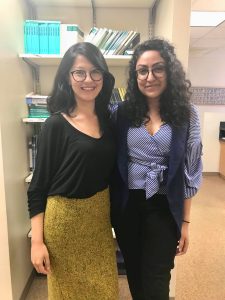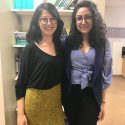Emotionally and professionally satisfying work in a new city

Photo credit: Rachael Folakemi Akinola
There are few things more exciting than being able to explore a new city while working in the field that you find emotionally and professionally satisfying. That, readers, is how I spent my summer of 2018.
Sponsored by the International Human Rights Program (IHRP) at the University of Toronto Faculty of Law, I spent my summer interning for the Women’s Rights Division (WRD) at the Human Rights Watch in Washington, D.C., under Amanda Klasing, senior researcher, and just an overall remarkable, awe-inspiring legal advocate.
My work for the WRD primarily focused on reproductive health care rights and legislation in the U.S. with some transferable research on anti-abortion and conscientious objection policies in the Americas. Especially in light of the anti-abortion policies arising under the Trump Administration, the WRD’s work has been voluminous and significant in this legislative sphere.
For my U.S. projects, I developed HRW’s portfolio on child marriage in the U.S.—an American phenomenon that, while historically always problematic, has received more attention in the last few months. As part of my work for this project, I met with other civil societies and engaged in advocacy work to produce effective on-the-ground collaborations. We prepared documents to persuade senators to implement an under-18 child marriage ban and made the topic more accessible for laypersons and non-legal activists.
Another project involved researching the roles of conscientious objection and religious rights in the U.S. and how they conflict with the provision of reproductive health care services. My research on the role of the right to conscientious objection as a rights-displacer was used not only to inform responsive policies in the U.S., but to challenge similar laws in Chile and Argentina that violate women’s health care rights in favour of institutional conscientious objection. My work posed solutions and questions to facilitate decision-making at the policy level for both HRW researchers and, ultimately, legislators.
Of course, legal research wasn’t all I got to do. For one advocacy project, I wrote a letter supporting a petition already moving through the optional protocol of the Committee on the Elimination of Discrimination Against Women to hold a country accountable for its human rights violations. The letter ended up being submitted with almost no revisions to the Committee, and the file is now under review. As a legal novice, being able to actually engage in the interplay between legal research and producing cogent legal arguments proved to be such a fulfilling exercise!
But, perhaps the most perspective-shaping project came towards the end of my internship, when I became ready (or perhaps more ready) to explore the tensions between human rights law and its violations. I produced academic theses that best captured the global attack on women’s rights today. I used evidence of violations of the rights to family, reproductive care, water, sanitation, sustainable environmental development, equal pay, and workplace accommodations to formulate a framework on the state of women’s rights in the world. Although tremendously challenging, creating these arguments forced me to think precisely like a human rights lawyer—a lawyer who is attuned to varying interests as she presents cautious and well-founded solutions to legal problems.
All of these experiences were monumental for me. If I could say anything to fully capture my internship at the Human Rights Watch it would be this: it was my coming of age moment as a legal professional. In doing meaningful work, in meeting like-minded, intelligent interns, researchers, and lawyers, and in actually going to the very places where legislation is made and passed to influence policy, I broke out of the realm of discomfort and challenges to find my voice as a legal scholar and soon-to-be practitioner. I’ll be forever grateful to the IHRP for helping me coordinate this project. If you, like me, came to law school to help make a global impact, I encourage you to seek out these opportunities early and enthusiastically!






